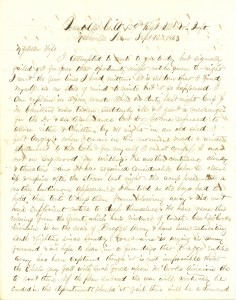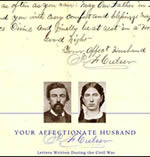 [google-map-v3 width=”400″ height=”300″ zoom=”12″ maptype=”hybrid” mapalign=”right” directionhint=”false” language=”default” poweredby=”false” maptypecontrol=”false” pancontrol=”false” zoomcontrol=”true” scalecontrol=”falso” streetviewcontrol=”false” scrollwheelcontrol=”false” addmarkermashupbubble=”false” addmarkerlist=”36.167783; -86.778365{}1-default.png” bubbleautopan=”true” showbike=”false” showtraffic=”false” showpanoramio=”false”]
[google-map-v3 width=”400″ height=”300″ zoom=”12″ maptype=”hybrid” mapalign=”right” directionhint=”false” language=”default” poweredby=”false” maptypecontrol=”false” pancontrol=”false” zoomcontrol=”true” scalecontrol=”falso” streetviewcontrol=”false” scrollwheelcontrol=”false” addmarkermashupbubble=”false” addmarkerlist=”36.167783; -86.778365{}1-default.png” bubbleautopan=”true” showbike=”false” showtraffic=”false” showpanoramio=”false”]
Head Qrs., Co. “A” 129th Regt. Ills. Vol. Inft.
Nashville. Tenn., Sept. 16th 1863
My Dear Wife
I attempted to write to you to-day but signally failed, yet, for fear that opportunity might not be given to-night, I sent the few lines I had written. It is seldom that I find myself in no state of mind to write, but it so happened. I can explain in a few words. While on duty last night, Corp. J. M. Chritten was taken suddenly ill, & I sent a messenger for the Dr. & an ambulance,1 but Dr. Johns refused to allow either, & Chritten lay all night in an old shed. I felt angry, &, when I came in this morning, made a written statement to the Col. [Case], &, for myself, I must confess I was not in any mood for writing.
The weather continues cloudy & threatens rain. It has required considerable labor to clean up & repair after the storm last night. The camp presented a rather ludicrous appearance, I am told, as the boys had to hold their tents to keep them from blowing away & did not have sufficient notice to dress themselves.
We have news this evening from the front which have evidence of truth: Gen. McCook’s Division is in the rear of Bragg’s Army & have been retreating south & fighting since Sunday. Rosecrans is urging his Army forward, & we hope to hear in a few days that Bragg’s entire army has been captured, though it is not impossible that the Rebels may fall with such force upon McCooks Division as to rout them.2 If the plan succeeds, the war will virtually be ended in this department. Should it fail, there will be a demand for more troops. Let us hope for the best.
Deserters are still joining, over 800 arrived on Monday.3 Some of them say that Bragg will fight, others say not; but he is evidently fighting now.
Day after to-morrow I shall probably have to go to Stevenson again. I have not heard from Bro. Johnie since he left Shelbyville. I heard, however, that the Battery [Miller’s] was near Chattanooga.
I have been thinking since the receipt of your letters that perhaps your visit [to Carlisle] was not as agreeable as it might be. Father must require all of Mother & Sister Hannah’s time, leaving but little to devote to you. I hope that you will not grow weary. I am very anxious to spend a short time with you there. I believe I can find items of interest after you have completed your searches. After thinking the matter over, I believe that I occupied the same room you now occupy. How many troops are there at Carlisle Barracks, & what troops are they?4
I have not yet had an opportunity of attending Sabbath School here. I hope I may be more successful next Sabbath. I shall expect a letter to-morrow morning from you.
[Lt.] Smith saw Leander Utley & says all the family are well. I am sorry to say I have not written to Maggie [Utley] yet.
How I should like to be in Carlisle to-night. Let us hope that at some day not far distant I may succeed in getting home. Give my love to all the family. Write all the news. I have not written to Mother [Murphy] since your arrival but should be happy to hear from her.
May God bless both Frankie & you, preserve you in health, & give you perfect happiness.
Good night
Your Affect. Husband
J. F. Culver
- James M. Chritten, a 20-year-old Pontiac farmer, was mustered into service on Sept. 8,1862, as a private in Company A, 129th Illinois, and was promoted to corporal, May 9, 1863. Corporal Chritten was mustered out near Washington, D.C., June 8, 1865. Compiled Service Records of Union Soldiers, NA. [↩]
- General Bragg, having failed to trap two divisions of Thomas’ corps in McLemore’s Cove, determined to hurl his columns against Crittenden’s divided corps, which was advancing south and southeast from Chattanooga. Before he could do so, Crittenden had concentrated his corps at Lee and Gordon’s Mills. Having failed again to strike Rosecrans’ army in detail, Bragg ordered his generals to take position east of the Chickamauga and be prepared to take the offensive as soon as Lt. Gen. James Longstreet arrived from Virginia with two divisions of his corps.
General Rosecrans now realized that he had been hoodwinked by Bragg. The Confederates were not in wild retreat as he had believed but massing and threatening to destroy his army. Rosecrans, on the 12th, to concentrate his army to cope with this menace, ordered Thomas’ and McCook’s corps to close to the left. Thomas’ troops held their ground, and on the 13th McCook put his divisions in motion from Alpine by way of Valley Head into Lookout Valley. Cist, Army of the Cumberland, pp. 189-191. [↩] - The number of Confederate deserters is exaggerated. Rosecrans’ provost marshal, in the period September 1-October 7, 1863, reported that about 750 Rebel deserters were counted. O. R., Ser. I, Vol. XXX, pt. I, p. 232. [↩]
- Mary Culver had written on September 2, “The ruins of the Barracks are plainly to be seen from my window and it looks quite natural to see the white tents of the soldiers clustered around them.” Mary Culver to J.F.C., Sept. 2, i863, Cuiver Collection. The Confederates had burned the Carlisle Barracks during the Gettysburg Campaign. [↩]

 Subscribe via RSS
Subscribe via RSS Subscribe via Email
Subscribe via Email